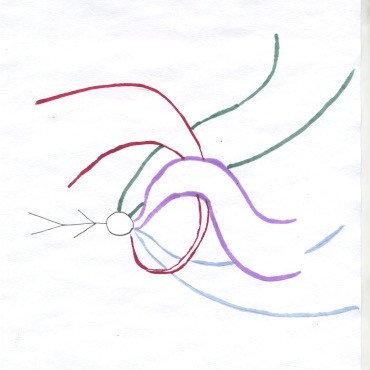As a Person of Colour, studying English literature is a battlefield
Four years of English literature and I still don’t belong
Every time I look at my grades on Moodle, it feels like my entire academic career is on the line. For the past year and a half, all I’ve wanted is to finish my English literature degree and get into a master’s of English program.
To do so, I work my ass off. Getting into grad school requires more effort than finishing an undergraduate degree. However, opening Moodle and seeing any grade below -A makes me feel like I don’t belong, and like all the work I've put into my degree is worthless. Once the thought pops into my mind, it settles there, and haunts my week.
I sometimes feel like I’m not smart enough to get into graduate school. My peers don’t seem to be working as hard as I am, and yet, they get better grades than me. The issue is, in each of my literature classes, I can count the people of colour with one hand. This means that when I compare myself to my peers, I’m comparing myself to white people.
It’s not like people of color aren’t interested in literature, or reading, or writing. So, why are we such a minority in the program? Is it because we’re purposefully pushed away?
Through B’s, “I didn’t understand what you said,” “I don’t think this writer was racist,” and professors saying slurs in class, we’re being pushed away from a space that clearly wants to remain white.
I started studying literature in CEGEP. I picked it because the classes sounded fun, and I liked creative writing. Before I started CEGEP, I had never, in my life, had a proper English class. I went to elementary school in Guatemala, where all our classes were taught in Spanish. When I immigrated to Quebec, at 12 years old, I was forced to go to high school in French.
This means that before going into the literature program, I had never read a classic, I had never written an essay, and I had never even had a class discussion on themes and literary devices. I knew virtually nothing.
My core English class in CEGEP was a class designed for people who needed help with their writing. I’m an English literature student. The same professor taught my English literature class, designed for people who had an interest and experience in writing. He was simultaneously teaching me how to write an English essay and teaching me an advanced literature course that only literature majors were allowed to take.
In my second or third week, after our first assignment had been submitted, the same professor went up to me in class and asked me why I was in a lower core English class. “I’ve never taken an English class,” I said. He was surprised, and said that was impressive. In my entire four years studying English literature, he’s the only professor who’s ever made me feel like I belong in my field.
For another class, we were assigned to read Othello, by Shakespeare. I remember my professor saying, “Just borrow the book from a family member, there has to be someone in your family who owns a copy of Othello.” I don’t have a parent, a grandparent, an uncle, an aunt, a cousin, not even a godparent that owns a copy of any Shakespeare play. I only have a few family members in this country.
I don’t have any of this cultural knowledge that white people have acquired from their parents, and their supposedly cultured families. I’ve had to learn everything about English literature by myself. No one in my family knows how to write an essay, what a hyperbole means, or which translation of the Illiad I should get. I’m the first person in my family to pursue post-secondary education in Canada.
All my peers, the ones who don’t work as hard as me and get better grades than me, have been taught how to read, write, and analyze the English language since they were born. They have had a welcoming invitation into the field of academia. Meanwhile, I have been actively rejected and pushed away from it.
It’s almost funny how my white professors always claim that voices of color are important in our field. They each have their own token writer of color that they emphasize in class, but do nothing to help or encourage their actively present students of color.
I had a professor tell me not to read out loud for the class again because I mispronounced a word I had never seen in my life. In turn, he pronounced my last name differently every single time he took attendance.
A white man in my discussion group kept diverting from the weekly topics and said offensive things. When my classmate said, "It's hard to get a job these days because people are so sensitive. We are going backwards I'd argue,” I told my TA I wasn’t comfortable showing up to our group anymore. As a Person of Colour, I didn’t feel safe. He answered saying he preferred an open mode of discussion, and that if I didn’t want my classmate to monopolize the conversation, I should speak more. This was a hurtful response to receive, since I felt my complaints had not been heard in the slightest.
All these experiences show that when I feel like I don’t belong, it’s because I’m being told I don’t. I need to fight my way into this field, but when I get a disappointing grade, I wonder if it’s worth it, or if I should just drop out.
There’s not one visibly racialized person in the current list of PhD students in the English department at Concordia. In order for my field to change, I feel pressured to be one of the few People of Colour who make it to graduate school.







_600_375_90_s_c1.jpg)